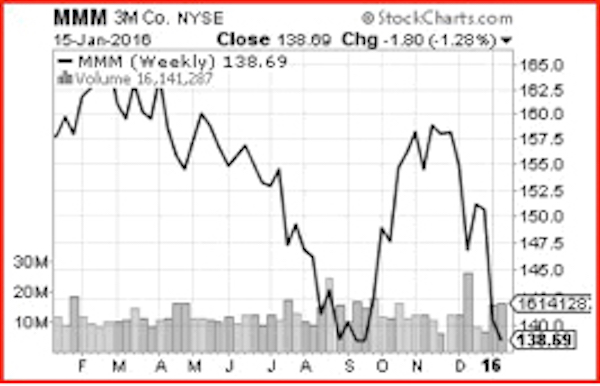Keeping Your Head in a Plummeting Market
The six-year bull market was great. Now that a bear looms, it will be the buyers who end up making the big money. Here’s why I like 3M Company.

Profit and prosper with the best of Kiplinger's advice on investing, taxes, retirement, personal finance and much more. Delivered daily. Enter your email in the box and click Sign Me Up.
You are now subscribed
Your newsletter sign-up was successful
Want to add more newsletters?
The way the year has begun in the stock market, you'd think the world was coming to an end. On a percentage basis, the first two weeks of trading were the worst ever for the Dow Jones Industrial Average. The price of crude oil has plunged below $30 per barrel, and there is no shortage of speculation about the imminent collapse of one company or another. Every gloomy headline feeds the selling frenzy.
There’s no doubt that a bear market (defined as a market decline of 20% or more) is a growing possibility. But bear markets have raged many times in the past. Indeed, the one thing that all bear markets have in common is that they come to an end.
So the question you must address is whether it is wise to sell the stock of companies that until recently you have been happy to own. You might ask yourself whether you would be selling simply because other people are doing so? To paraphrase Rudyard Kipling, by way of Warren Buffett, the successful investor is the one who can keep his head while all about him are losing theirs. Corporate profits tend to fluctuate and can be under pressure from temporary situations—even just the emotional responses of shareholders to issues that are beyond the control of the company.
From just $107.88 $24.99 for Kiplinger Personal Finance
Become a smarter, better informed investor. Subscribe from just $107.88 $24.99, plus get up to 4 Special Issues

Sign up for Kiplinger’s Free Newsletters
Profit and prosper with the best of expert advice on investing, taxes, retirement, personal finance and more - straight to your e-mail.
Profit and prosper with the best of expert advice - straight to your e-mail.
We’ve all enjoyed the bull market that has expanded over the past six years. But, still, it pays to recognize that it has to rain at some point. It’s vital for the process. But that’s not how people react. Based on the response of stock market participants, you might believe that the sight of dark clouds portends the end of the world. When the pessimists take over, the stock market generally spirals downward. But it’s the optimists who end up making the big money. These are the people who are buying when everyone is selling.
That’s not an easy thing to do! And that’s why dollar-cost averaging (and dividend reinvesting) is such an important strategy during turbulent markets. Even if you don’t possess a cool head, this strategy will help you overcome your tendency to overreact to short-term market conditions so you can take advantage of the opportunity provided by those who do.
As an investor, you have to find a way to overcome your natural reaction to overreact to the noise—regardless of whether it is optimistic or negative. The objective is to build wealth by logical purchases of high-quality companies at relatively good prices. Dollar-cost averaging does just that.
Every two weeks, we select a company that we believe is appropriate for your core holdings. We do not consider the market price of the stock when we make these selections. That’s because we anticipate that the reader will build up holdings in these companies by investing a small or large amount on a regular basis through the company dividend reinvestment plan (DRIP).
We recommend the enrollment service of our affiliate company, Temper of the Times Investor Services, as a means to become enrolled in the DRIP of this company or any other of about 1,000 companies that offer the opportunity to invest directly—thereby bypassing brokers.
Our current recommendation is 3M Company (MMM). Founded in 1902 as Minnesota Mining & Manufacturing Company, 3M has grown into a $85-billion market cap manufacturer that sells more than 50,000 products around the world, with more than 60% of sales from foreign sources. It operates in five industry segments: Industrial (abrasives, adhesives, sealants, filtration products); Health Care (medical and surgical supplies, dental and food safety products, drug delivery and health information systems); Safety & Graphics (traffic safety and security products, commercial graphics, cleaning, and protection systems, flooring and roofing products); Consumer (home care, improvement, and protection products, office tapes, pads, and note products, cleaning supplies); and Electronics & Energy (touch screens, connection devices, optical films, packaging, insulating, and renewable energy products).
Best known for its Post-It Notes and Scotch tape, 3M now makes everything from dental products and bandages to touch-screen monitors, asphalt shingles, and air conditioner filters. According to Yahoo! Finance, the consensus of 16 analysts called for 3M to earn about $7.55 per share in 2015 and $8.23 in 2016, compared with $7.49 in 2014, when annual sales topped $31 billion. The $4.10-per-share dividend, which provides a 2.9% yield, has been increased for 57 consecutive years, and is expected to be raised with the next payment in February.

What makes 3M so attractive is its scope and resources, which contribute to its proven ability to thrive in virtually any economic environment. Throughout its history, the company has prospered by constantly developing new products, both for consumers and commercial customers, with the result that it has been able to expand both here and abroad. In doing so, 3M has established itself as one of the most widely recognized (and trusted) brand names in the world, and by constantly expanding its product lines in all industries, has become a supplier of countless basic necessities.
As an investment, its stock has benefited by establishing a top-notch balance sheet and enviable history of growing sales, earnings, and dividends; yet the share price is not overvalued, trading at less than 17 times year-ahead earnings per share. The stock is down from a 52-week high of $170, compared with a low of $134.
3M Company is one of many top U.S. companies whose shares you can purchase directly—and commission-free—through their company-sponsored DRIP. These companies actually pay the investing fees for you once you’ve enrolled in their DRIP—and you can enroll with the purchase of just one share in most cases. For our complete list of companies that offer a no-fee DRIP, click here.
Ms. Vita Nelson is one of the earliest proponents of dividend reinvestment plans (DRIPs) and a knowledgeable authority on the operations of these plans. She provides financial information centered around DRIP investing at www.drp.com and www.directinvesting.com. She is the Editor and Publisher of Moneypaper's Guide to Direct Investment Plans, Chairman of the Board of Temper of the Times Investor Service, Inc. (a DRIP enrollment service), and co-manager of the MP 63 Fund (DRIPX).
Profit and prosper with the best of Kiplinger's advice on investing, taxes, retirement, personal finance and much more. Delivered daily. Enter your email in the box and click Sign Me Up.

-
 Timeless Trips for Solo Travelers
Timeless Trips for Solo TravelersHow to find a getaway that suits your style.
-
 A Top Vanguard ETF Pick Outperforms on International Strength
A Top Vanguard ETF Pick Outperforms on International StrengthA weakening dollar and lower interest rates lifted international stocks, which was good news for one of our favorite exchange-traded funds.
-
 Is There Such a Thing As a Safe Stock? 17 Safe-Enough Ideas
Is There Such a Thing As a Safe Stock? 17 Safe-Enough IdeasNo stock is completely safe, but we can make educated guesses about which ones are likely to provide smooth sailing.
-
 Missed Your RMD? 4 Ways to Avoid Doing That Again (and Skip the IRS Penalties), From a Financial Planner
Missed Your RMD? 4 Ways to Avoid Doing That Again (and Skip the IRS Penalties), From a Financial PlannerIf you miss your RMDs, you could face a hefty fine. Here are four ways to stay on top of your payments — and on the right side of the IRS.
-
 What Really Happens in the First 30 Days After Someone Dies (and Where Families Get Stuck)
What Really Happens in the First 30 Days After Someone Dies (and Where Families Get Stuck)The administrative requirements following a death move quickly. This is how to ensure your loved ones won't be plunged into chaos during a time of distress.
-
 AI-Powered Investing in 2026: How Algorithms Will Shape Your Portfolio
AI-Powered Investing in 2026: How Algorithms Will Shape Your PortfolioAI is becoming a standard investing tool, as it helps cut through the noise, personalize portfolios and manage risk. That said, human oversight remains essential. Here's how it all works.
-
 A Newly Retired Couple With a Portfolio Full of Winners Faced a $50,000 Tax Bill: This Is the Strategy That Helped Save Them
A Newly Retired Couple With a Portfolio Full of Winners Faced a $50,000 Tax Bill: This Is the Strategy That Helped Save ThemLarge unrealized capital gains can create a serious tax headache for retirees with a successful portfolio. A tax-aware long-short strategy can help.
-
 5 Retirement Myths to Leave Behind (and How to Start Planning for the Reality)
5 Retirement Myths to Leave Behind (and How to Start Planning for the Reality)Separating facts from fiction is an important first step toward building a retirement plan that's grounded in reality and not based on incorrect assumptions.
-
 I'm a Financial Adviser: Silence Is Golden, But It Hurts Your Heirs More Than You Think
I'm a Financial Adviser: Silence Is Golden, But It Hurts Your Heirs More Than You ThinkTalking to heirs about transferring wealth can be overwhelming, but avoiding it now can lead to conflict later. Here's how to start sharing your plans.
-
 Will Your Children's Inheritance Set Them Free or Tie Them Up?
Will Your Children's Inheritance Set Them Free or Tie Them Up?An inheritance can mean extraordinary freedom for your loved ones, but could also cause more harm than good. How can you ensure your family gets it right?
-
 I'm a Financial Adviser: This Is the Real Key to Enjoying Retirement With Confidence
I'm a Financial Adviser: This Is the Real Key to Enjoying Retirement With ConfidenceA resilient retirement plan is a flexible framework that addresses income, health care, taxes and investments. And that means you should review it regularly.